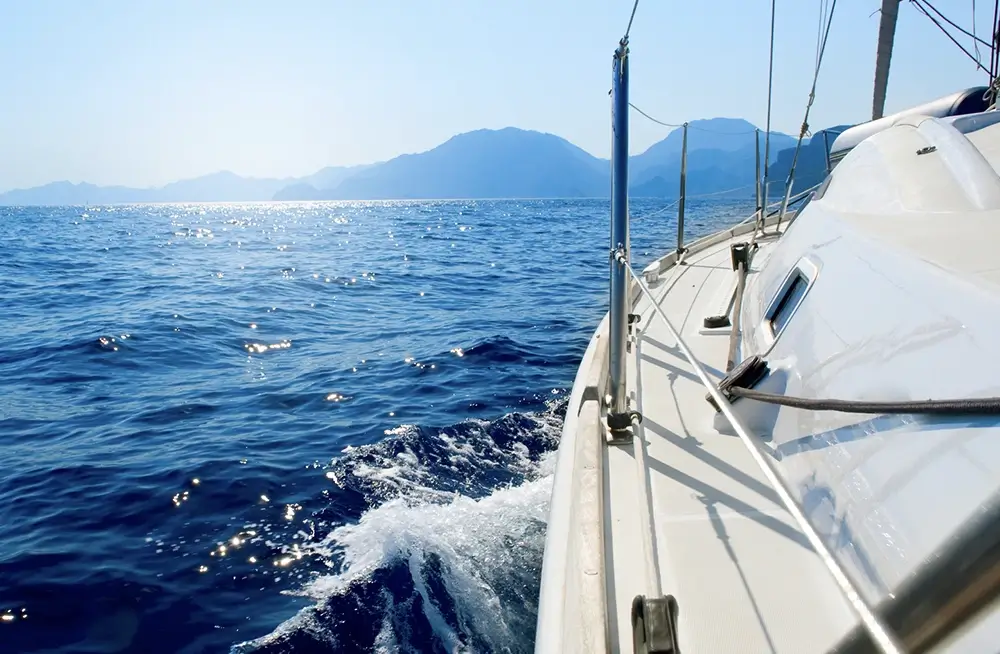
Top 7 Effective Seasickness Remedies
What Is It Like to Get Seasick?
The continuous movements of moving up and down in a boat can create a kind of motion sickness known as seasickness. Seasickness is a sort of motion sickness. The inner ear begins delivering information to the brain that are distinct from those that are being seen by the eyes, and the mixed signals cause you to feel ill because of the confusion they bring.
You will be able to learn about our top 7 proven and tested seasickness cures in our article before you set sail on your next adventure.

Seasickness Remedies Europe Yachts Charter 1
How to Protect Yourself from Motion Sickness
Do I Have Reason to Be Concerned?
You have every reason to be concerned, but it never hurts to be warned about anything. Keeping motion sickness at bay when sailing on a yacht rental is a worry for all aspiring sailors and even some experienced sailors. It’s possible that you’re excited to go, but you’re nervous about being sick the entire time. Although motion sickness is something that can affect everyone, the great majority of people either recover from it very quickly or don’t suffer any symptoms at all if you take adequate precautions. Take attention to what we have to say about the best cures for motion sickness, which we have supplied for you below, and you will be well prepared for your trip out on the water.

Seasickness Remedies Europe Yachts Charter 2
When Will I Feel Sick?
Is There Always the Same Amount of Danger Associated with Being at Sea?
To begin, the vast majority of people do not feel ill at all, feel only minor symptoms, or get over it quite quickly; however, there are key times to take special care and consider using one of our seasickness remedies. If you experience any of these key times, you should consider using one of our seasickness remedies.
- When We First Started. When you first embark on a voyage, you are at a greater risk of being seasick than at any other time. Your ability to adjust to the new environment will improve as the duration of your sailing vacation increases.
- When things get difficult. It is more probable that you will become seasick if the boat is rocked and jostled around by the waves. If this is your first time sailing, you should hopefully spend your first few days in a location that is warm, sunny, and peaceful. In that case, you should take extra precautions to check out our motion sickness cures well in advance.
- Long Passages. The longer you remain at sea without stopping for any sort of break, the greater the likelihood that you may become unwell. There is a good possibility that you are on a sailing vacation that includes short hops on the itinerary, which will allow you to disembark and go for a swim whenever you need to feel much better.
- There are some points of sail. Now things are getting serious! It doesn’t matter if you’re on a motorboat or a sailing boat; the point at which the wind strikes the vessel causes it to act differently depending on where you are. When the wind is at your back, the boat will have a greater propensity to “wallow” or rock from side to side. Therefore, if this is the case, make sure you read on, take the necessary measures, and continue to feel wonderful.
- During the night and when visibility is poor. If you can’t see the horizon, you put yourself in a vulnerable position, which increases your chances of experiencing adverse conditions. If you are going out to sail during the night or when visibility is poor while on a charter, make sure to take the necessary safety precautions.

Seasickness Remedies Europe Yachts Charter 4
How Will I Feel When I Have Seasickness?
Is Motion Sickness Always the Same?
The most of us have, at some time in our lives, suffered from motion sickness, or at the very least, seasickness. In a car, when fishing, on a ferry, in a railway or coach, and so on and so forth. It is essential to keep in mind that just because you experience motion sickness on a ferry, cruise, or even in a car does not mean that you will experience the same thing on a sailing boat. That is not the same as saying that it is not more likely; nonetheless, it is not a certainty. Being outside in the fresh air may make all the difference, and the motion of a sailing yacht can be quite different from that of, for example, a ferry that travels across the English Channel.
If you are not very familiar with the sensation, seasickness can range from feeling a bit off-color to vomiting and feeling very badly indeed. If you are not very comfortable with the sensation, you are more likely to experience the latter. We are relieved to report that the great majority of people who take measures do not become ill, and that the situation improves quite fast.
It doesn’t matter if you’ve been sailing for years or if it’s your first time out on the water; motion sickness is one thing that can ruin even the best day on the water, and it may strike anybody at any moment. Some people find that sailing in rough waves is part of the adventure, but even the most experienced sailors might get unsteady on their feet after a particularly challenging day at sea.
If you’re wondering how to avoid getting seasick on your next sailing trip, we’ve put together some of our best tips and seasickness remedies to help you either prevent seasickness from occurring in the first place or treat it once it does occur so that you can get on with your day and enjoy yourself.
1. Have the necessary medications on hand.
2. Purchase a Motion Sickness Band
3. Monitor What You Eat 4. Avoid Going Below
5. Maintain Your Focus on the Horizon
6. Avoid jobs that need close attention.
7. Avoid reading at all costs.

Seasickness Remedies Europe Yachts Charter 5
1. Always Come Equipped with the Necessary Medication
You shouldn’t be afraid to bring a few different options with you. For the Record
Talking to your physician is something you should consider doing if you have ever felt unwell while being on the water or if you have had any other kind of motion sickness. For less severe instances or journeys of shorter duration, they will be able to provide suggestions for over-the-counter medications that can be used to treat seasickness.
Your doctor may also prescribe drugs for you if the motion sickness lasts for a longer period of time or if it is severe. Be aware of any potential adverse effects, though, since certain kinds may cause you to feel sleepy.

Seasickness Remedies Europe Yachts Charter 6
2. Obtain a band to prevent motion sickness.
Acupuncture on the Go For a Quick Fix
Investing in a bracelet that is especially intended to alleviate the vomiting and nausea that are associated with seasickness is one of the more unorthodox treatments for motion sickness that many people swear by. These may be purchased at a wide variety of pharmacies, and they take the form of an elastic or plastic bracelet that has a plastic stud fastened to the interior of the band.
The bands employ acupressure techniques to apply pressure to a specific place on your wrist, which is often where your watch would sit, in order to bring relief. This location is normally where your watch would sit.

Seasickness Remedies Europe Yachts Charter 7
3. Watch What You Eat Make sure to steer clear of foods that have a potent odor, are very spicy, or are very heavy.
This simple adjustment has the potential to make a significant impact on the degree to which one is affected by motion sickness when sailing. Be mindful of what you eat before you set sail as well as when you are onboard, especially if you have previously discovered that certain foods upset your stomach on land.
Acidic foods, such as tomatoes and citrus fruits, as well as meals that are fatty, hot, and/or heavy, can frequently be found to be major contributing factors. If at all possible, stay away from alcohol and stick to meals that are lighter on the food.
In terms of the food that you are permitted to consume, you should try to stick to the more bland options, particularly when you are on board. Because you still need to have something in your stomach, safe meals like crackers, soft drinks, and ginger are all good options that are frequently used. Ginger, in instance, is one of the most well-known cures for seasickness, and it can be consumed as a tea, candied, or in its raw form. You don’t much like for ginger, do you? Instead, you could try taking ginger in pill form.

Seasickness Remedies Europe Yachts Charter 8
4. Don’t Descend Any Further
Maintain as much of your head above water as possible.
When you’re feeling seasick, getting some fresh air in your lungs is quite crucial. Maintaining your composure and keeping your head above deck will give you a far higher chance of feeling better in the long run, even if at the moment it seems like the most sensible thing to do is to lie down, shut your eyes, and wish for land to appear.
If you are feeling ill, you should try to position yourself in one of the following three areas: the front of the boat, where you will be exposed to the most fresh air; the middle of the boat, where you will be less likely to feel the shaking of the boat; or the cockpit, where you will be higher up. A couple of the most effective treatments for motion sickness include breathing in some clean ocean air and taking in the scenery of the water around you.

Seasickness Remedies Europe Yachts Charter 9
5. Don’t Lose Sight of the End of the Road
Although it May Seem Like an Old Wives’ Tale, It Is Actually Effective.
When you are above deck, one of the most effective treatments for motion sickness is to concentrate on the horizon or, much more effectively, on a stationary landmass if one is there. If you make the horizon your brain’s point of reference, it will be able to detect the movement of your body in sync with the movement of the ship.
Steering the boat, if you are able to do so, is both one of our cures for seasickness and a beneficial activity to do while you are onboard since it allows you to keep your focus on the horizon and contributes to the vessel being on course.

Seasickness Remedies Europe Yachts Charter 10
6. Stay away from jobs that need close visual acuity.
Put your attention on the overall picture rather than the specifics.
If you are feeling seasick, you should avoid doing any activity that needs you to concentrate on what is directly in front of you. For example, tying a knot or winching may seem like simple activities, but you should avoid doing anything that requires you to do so. The same is true while looking through binoculars or a compass for an extended period of time. Great treatments for motion sickness include keeping yourself occupied with activities that help you to become distracted from your condition in order to divert your attention away from it.
You may try meditating, talking to a friend, or learning something new about sailing from the crew. Start a discussion with a buddy, close your eyes, and meditate.

Seasickness Remedies Europe Yachts Charter 11
7. Refrain from Engaging in Reading
Also, avoid doing things like watching television or playing games on your phone.
In a similar line, one of the worst things you can do when you have some free time is attempt to concentrate on a book or your phone, which is one of the worst things you can do in general. If you are prone to seasickness, your body may have trouble adjusting to the overall motion of the sea when you are on board a ship that has immovable things. It might make your nausea much worse if you try to concentrate on the words on the page when you are experiencing it.
Alternately, you may try listening to a podcast or an audiobook to help pass the time until you either feel better or see land in the distance.
Now that you have treatments for seasickness to prevent you from being unwell on your next big sailing adventure, are you ready to set sail? With our compilation of the Best Places to Sail This Summer as well as the Best Places to Sail During the Winter, we’ve got you covered. Find out where you are allowed to sail to and what kinds of limitations are in place at the moment.







